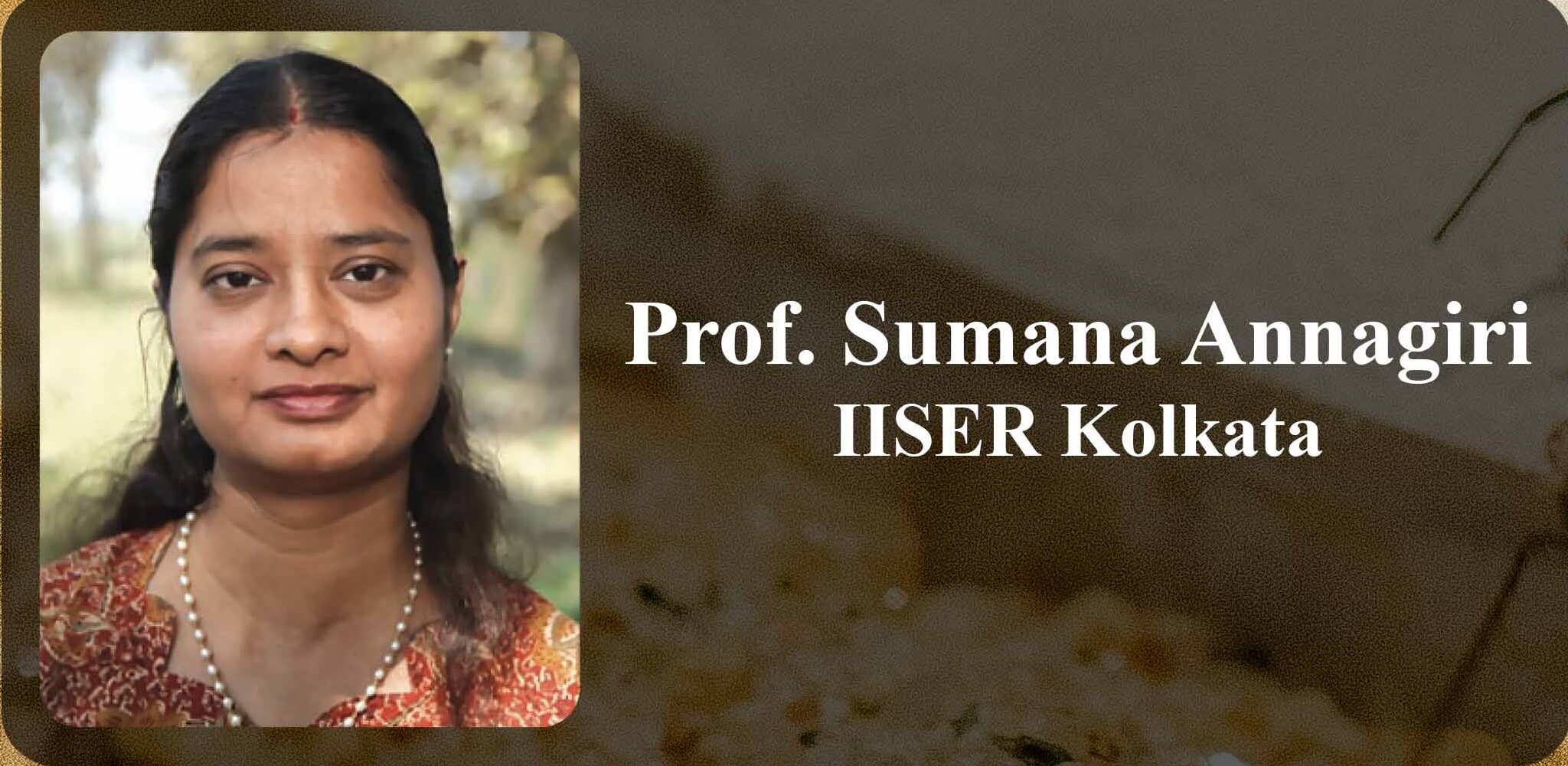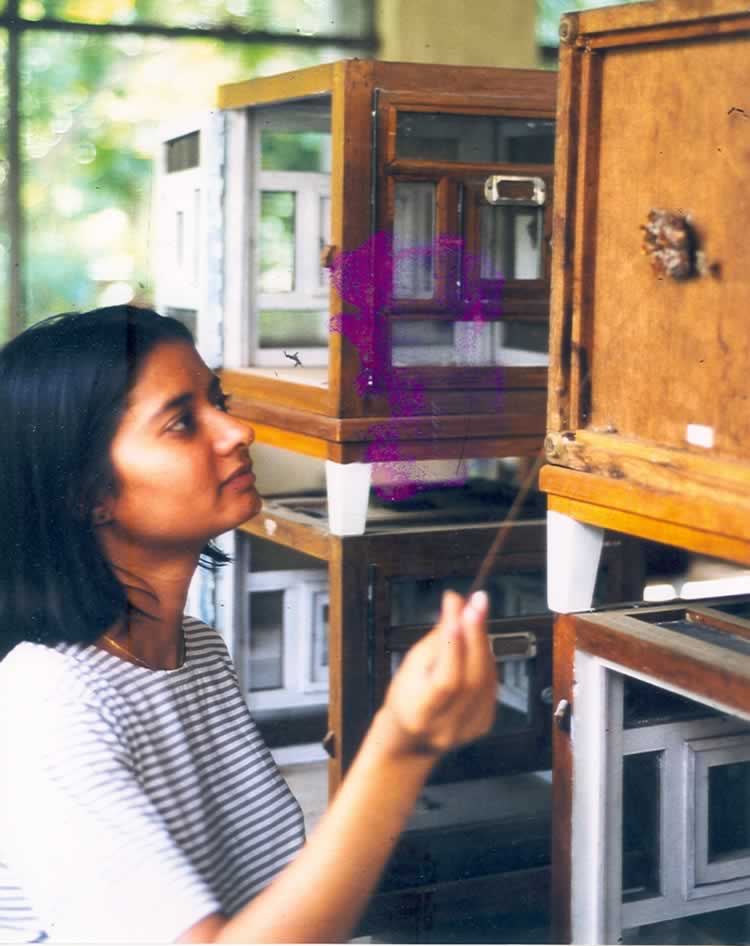#WIISER Spotlight | Prof. Sumana Annagiri : With curiosity driven science, towards blue-sky research
WIISER : Women in Science at IISER Kolkata
Vedanth Sriram and Arunita Banerjee

Prof. Sumana Annagiri joined IISER Kolkata as an Assistant Professor in October 2008. Her lab studies nest-relocation dynamics in an Indian ant species, trying to understand the strategies and priorities involved in the process.
1. What led you to pursue a career in science, and what do you feel are the hardest aspects of doing science?
Curiosity about living creatures. I have always wanted to understand the lives of other organisms, their challenges and how they deal with it.
Time is the hardest aspect of doing Science. Every question you ask takes a great deal of time to answer and it only leads to more questions. So it is a challenge for those of us whose lives revolve around research. We are immersed in it all the time, but still feel there is so much more to do.
2. If a layperson asked you about the research in your lab and why it’s important, what would you tell them?
I typically say, what we do in our lab will not provide a cure for any human malfunction or disease. We glimpse into a more ancient society, that of ants. These are about 140 million years older than ours and we explore how they function. Its important because we as humans are always interested in what is going on around us. Only by understanding the environment around us, both the biotic and abiotic factors can we live in harmony with Nature. I also give an example about the importance of doing fundamental or blue-sky research. Let us think about the lunar eclipse. We could have dismissed it as some clouds covering the face of the moon, so what is the big deal? But being curious about it, understanding that it was not just some clouds covering the moon has laid the path to discover several facts about the earth’s position in the galaxy and how to accurately calculate the trajectories of different objects in space. Combining this knowledge together with several other technological innovations, we launch satellites into space today in order to change the way we communicate with other members of our society and impact our day to day lives.
3. The story of Dr. Kamala Sohonie, the pioneering biochemist and first Indian woman to receive a PhD (from IISc), and how she fought against the prejudice and bias towards women in science by the then Director of IISc, Dr. C.V. Raman is moderately well known. You too were a PhD student at IISc. Through your vast experience both as a PhD student at IISc, and now as a professor at IISER-K, have you seen any improvements in not only the research environment but also attitude towards female researchers in India? Were there any instances of bias or prejudice that you faced in your own journey that you can share with us?

Sumana inspecting a wasp nest. A still from her graduation days at the lab of Prof. Raghavendra Gadagkar at IISc.
Yes, I did my PhD at IISc. In fact, I did my schooling at IISc Kendirya Vidyalaya as well. It would be probably true to say that if I did not do my PhD at IISc, I would not have done a PhD at all. Before I had my results from my MSc, I had cleared my interview at IISc. My father, who had by then retired from IISc after working as a staff member for more than 35 years, held it in high regard and allowed me to join the institute for my PhD. If I were to go anywhere else my parents would have objected as they believed that I had studied enough and it was time to settle down in life.
As I come from a very orthodox family, coming to IISc for my PhD opened new horizons for me. I was not really conscious that girls can be similar to boys before that. I used to take it for granted that girls are different and they cannot be like boys across several different aspects of life. It was essential for us girls to learn to be obedient, this was a good quality. Just do what you are told, do not ask questions was the norm. So, for the first time I would think, ask questions and had the freedom to pursue them when I started PhD. At IISc I saw that equality between genders was even possible.
Yes, I have seen cases of bias and experienced bias myself. It is not essential to list them, but to think about how to address them. Of course, there are not enough women, many of those who are there may not understand the need for equality as we have come through a system that is overshadowed by men. There needs to be a two-way dialogue, both at the workplace and at home, between partners. For gender equality to develop in the society, the next generation of children have to be raised in an environment where they do not see this discrimination.
Has it changed? I do not know, as we live in a cocoon, we only get limited exposure to the society at large. I would have to go back to where I grew up and relate to the people living there currently, to know if these biases have changed, because being a behavioural biologist I can only say that I do not have the right data set to answer this question. I hope that it has changed. But it's very important to remember that we will have a great deal of variability in this parameter depending on local conditions in every household, the geographic location that people inhabit and their own specific exposure.
4. As a follow up to the previous question, why do you feel there are fewer female faculty in top administrative posts in Indian academic institutions? What changes do you feel will help improve the faults in the system for the better?
There are several factors. Bearing and caring for children is known to be one of the biggest hurdles. This decreases the initial numbers greatly. As you move forward, juggling a series of tasks, arguably more kinds of tasks than men, can become a challenge. This in turn would make women less likely to commit to additional duties. Further, the mindset of people taking decisions needs to change. They need to recognize that a diverse workspace is essential for a healthy organization and for this to happen, women have to be incorporated into all levels of functioning. It is essential for women to set examples of their leadership capability irrespective of what capacity they work in order to change this mindset.
In the long run, bringing up our boys and girls on an equal footing, in terms of opportunity and encouragement is essential. In the short term talking to female employees within the organization in an open manner to understand their specific challenges and being proactive in addressing these issues are important. Further, having a fair redressal system for any gender-based problems that crop up is critical for maintaining a safe environment in which girls and women can function.
This electronic interview was coordinated and conducted by Vedanth Sriram and Arunita Banerjee for Cogito, IISER Kolkata. Vedanth Sriram is a 3rd Year BS-MS student at IISER Kolkata. Outside sitting in whatever course seems remotely interesting to him, you’ll mostly find him exchanging trivia with anything that breathes. He intends to graduate in 2022, or whenever the coronavirus will let him.
signup with your email to get the latest articles instantly